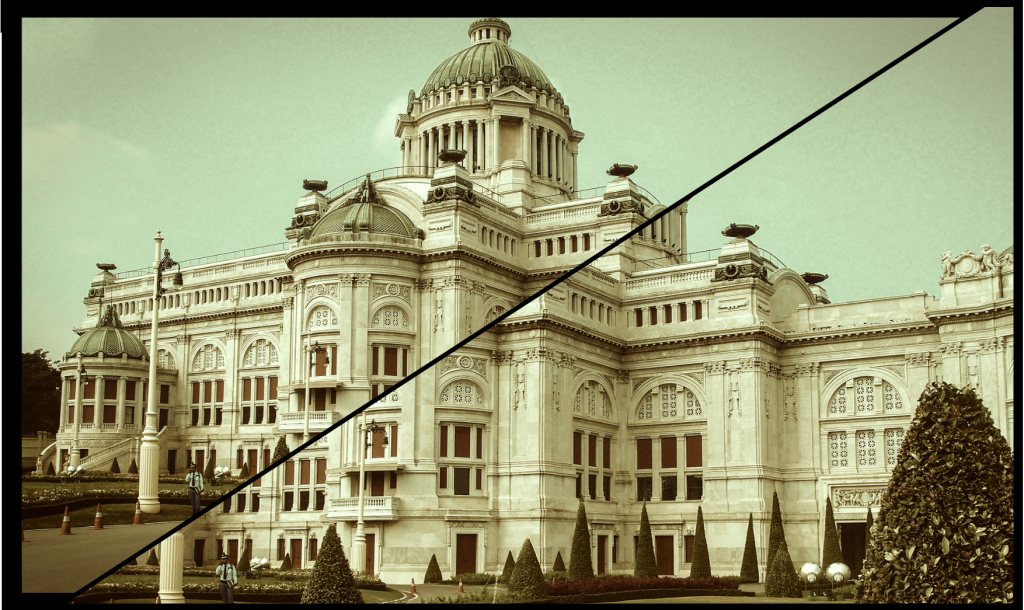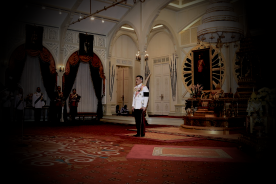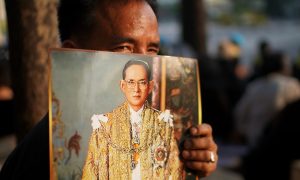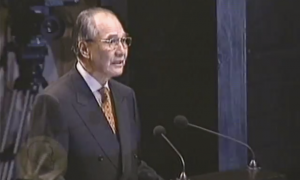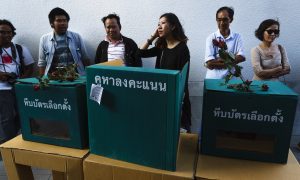“Thailand has everything,” a royalist friend once told me, at the height of the 2006 Thai political crisis. “Everything is so good—nature, culture, art, our King [Bhumibol at the time]. But we have the world’s worst politicians”. It is a refrain that many studying Thai politics have heard often in the past few years, and it is a sentiment that led the military to allow, in the 2017 constitution, for an unelected prime minister—a “good person” (khon dii) untainted by the supposed stain of electoral democracy.
In the 2006 “good coup”, this idea of khon dii was a way to install royalists in power who did not have to enjoy popular support. Meanwhile in 2017, cynics (rightfully) pointed to the fact that this opening was a convenient one for junta leader and current Prime Minister Prayuth Chan-ocha to remain in power.
So the irony of this clause, and the desire for a candidate outside of the constitution being used to bring a former princess to the political stage to challenge Prayuth, should not be lost. On 8 February, the Thai Raksa Chart (“Thais Love the Nation”, a party aligned with the Pheu Thai party, itself a successor to the Thai Rak Thai party of Thaksin Shinawatra) nominated former Princess Ubolratana Mahidol—a sister of the current King, although stripped of her royal titles upon marrying a foreigner—as its sole candidate for prime minister in elections scheduled for 24 March.
What caught observers off-guard was that the party nominating the (formerly) royal Ubolratana was not the military-allied Phalang Pracharat or the royalist Democrat party—but a party allied with the man ousted from power in the name of Ubolratana’s father. Clearly something had shifted in the configurations of power (although some speculated that there was a long game afoot to discredit all Thaksin-associated parties).
But even that was hardly the most striking development in the story. Despite the fact that Ubolratana had officially lost her royal status years before due to her marriage to a foreigner, her own brother, King Vajiralongkorn, contested Ubolratana’s eligibility to act as Thai Raksa Chart’s candidate. On 11 February, the Election Commission concurred, and Ubolratana was officially denied permission to run on the grounds of her royal status (interestingly enough thus clarifying that Ubolratana was indeed a royal, and that all of her status was not stripped from her upon her marriage).
Such a public split within Thailand’s royal family would have been unheard of ten years ago. The public image of the monarchy peaked in the late 20th century in a kind of model divine family (although, see Paul Handley’s 2006 The King Never Smiles). In the late Bhumibol-era propaganda, each royal child had his or her own role—a kind of pantheon of patron saints (or, as each royal’s power complemented the other, perhaps more akin to the Avengers). Vajiralongkorn (the only son) was to be the soldier, Sirindhorn the patron of the arts and humanities, Chulabhorn the scientist and Ubolratana the fashionista.
But what was to happen when this unity collapsed, as it had to eventually when the barami (authoritative charisma) of Bhumibol was not enough to keep the family together? What was a party like Thai Raksa Chart, widely considered to be in opposition to an assumed monarchy–military alliance, doing with a royal at its head, however briefly? What do we make of the public split between brother and sister playing out in the political sphere?
It is my case that these developments point to a clear end of a Thai politics divided between “red” Thaksinites and “yellow” royalists. It also points to a split between the presumed alliance of military and monarchy, and a challenge to the notion of a unitary “network monarchy” hiding behind Thai politics. The events of 8 February and their aftermath are a part of a slow succession crisis, reflecting a struggle over the creation of new patronage networks and new workings of the “power outside of the constitution”.
Power outside the constitution
When the military intervenes in Thai politics, it often cites a legitimacy outside the constitution. Indeed, the phrase “power outside the constitution” has been shorthand in Thai politics for those figures (i.e. royals) that are protected by lèse-majesté laws. For royalists, monarchical and military action was framed as protection of “Thai” values, framed as of anti-corruption, anti-communism, or simply a love for the barami (authoritative charisma) of the monarch. In this model of a kingly virtue at the centre of a timeless “Thainess”, epitomised by the thought of conservative intellectuals such as Kukrit Pramoj, Anand Panyarachun, and Surin Maisrikrod, the mess of politics and electoral democracy serves as challenge to be overcome, not as a source of legitimation in itself.
For royalists of the later 20th century, coups then—especially “bloodless” or “good” coups such as 2006 or 2014—are a feature of Thai democracy, not a bug. Rhetoric of a righteous rule by moral “good people” furthered this sense of a wise, royal elite carefully guiding a populace too susceptible to manipulation by outside forces to be permitted free reign. In later years, this latter ethos was epitomised by Thailand’s Democrat party, a group of royalists who supported democracy only when it did not conflict with the wishes of the “good people”.
Thus, for much of recent Thai history, the military and monarchy existed in a kind of symbiosis, although who the puppet and who the puppeteer was always an open question. Depending on the time period, the military could be thought of as either manipulating the public image of the monarchy as a source of legitimacy for its actions, or on the other hand acting as the tool through which the desires of the monarchy would be made manifest, untainted by the stain of “politics”. Indeed, this latter sort of intervention-by-proxy maps well onto Thai cosmological models of power, wherein power is divided: both passive and holy (barami) as well as able to work its will (amnaj).
A rebuke against a sister and the personalising of monarchical control
Paul Chambers on King Vajiralongkorn's expanding control over state forces
This might be the very thing that troubles Prayuth. If monarchical authority can function in the same way as political authority, there may be no room for power outside the constitution. The military, then, would be set adrift without a source of legitimacy for its actions. Such a situation might mean a world where the military is accountable to Thai civilians for its actions.
The end of the rainbow
Since the mid-2000s, Thai politics has been widely characterised as a clash between “red” and “yellow”, colours referencing the shirts of protest moments supporting Thaksin Shinawatra and royalist conservatives, respectively, from 2005–14. The Reds were cast, by their enemies, as naïve shills for a power-hungry immoral plutocrat or, by their advocates, as campaigners for a truly democratic Thailand. The Yellows were, similarly, cast either as moral bulwarks against corruption or the foot soldiers of an obsolete, parasitic oligarchy.
But there were complications to this narrative even as it developed. In my own fieldwork, I was told at a red-shirt rally that Thaksin was simply a tool—a highly problematic means to an ultimately democratic end. An hour later, another person told me that Thaksin should hold onto power for as long as was possible in order to give the economy the boost it needed, even were that to mean resorting to undemocratic means. Similarly, yellow organisations encompassed a variety of outlooks, from advocates for environmental causes and civil society, to anti-capitalist crusaders, to unabashed authoritarians claiming that the 2010 massacre of red shirts was not enough. Elsewhere, many of the core “yellow” NGOs, journalists and academics—initially alienated by Thaksin’s repression of critical voices—suddenly found themselves facing a far worse situation under the military regime.
Ubolratana’s announcement made these fissures within “red” and “yellow” apparent, at least in the flurry of discussion on social media since 8 February. Many former yellow shirts who saw Thaksin as the source of all Thai corruption bemoaned the association between such a despised figure and a royal. Some of those seeking a democratic Thailand found themselves cheering for a royal to enter politics, citing the difficult position in which the announcement placed Thailand’s military rulers. Observers on both sides wondered what it meant to have a candidate who might be protected from criticism by Thailand’s strictly-enforced lèse-majesté laws.
A house divided
In short, while it has long been time to stop characterising Thai politics as divided between a royalist military-monarchy alliance and a (crony)-capitalist-democratic one, Ubolratana’s announcement puts a final rest to the debate. In the new terrain of Thai politics, one can be a Thaskin-supporting royalist, an anti-Shinawatra democrat, a fan of military rule who seeks to limit the powers of the monarchy, and any other number of different configurations and networks of power that would not have been thinkable five years ago. Thai politics already had difficulty fitting into traditional notions of “left” and “right”—now it deserves another re-thinking.
Royal successions in Southeast Asian history have a tendency to be messy, as the inheritor of a deceased monarch’s barami—the morally legitimate successor to rule—might not be the one which palace law places upon the throne. And for all of Bhumibol’s long reign and successful public image, Thai royalists feared the division that might come of his death, as evinced by the spike in lèse-majesté convictions as Bhumibol’s health failed. The possibility for chaos following Bhumibol’s death was one that, rumours went, provoked the military into seizing and keeping power in anticipation of the late king’s death, through his funeral and through Vajiralongkorn’s coronation.
But Prayuth’s power is not Field Marshal Sarit Thanarat’s, and Thailand in the 21st century is a different place. Duncan McCargo described the Thai monarchy as a “network monarchy”, meaning a situation where the palace remained symbolically powerful but increasingly reliant upon coopting other actors to shore up its power base. But with a fragmented royal family comes a weakened network. And it has fragmented in ways that surprised many Thai political observers and confounded the mess of rumours that have long surrounded the palace.
Rumours of Thaksin’s efforts to win over the current king seem not to have panned out. Whispers of a challenge to royal authority from Crown Princess Sirindhorn likewise do not seem to have manifested—this is not owing to a lack of popular support or power; the Siam Piwat group, in which Sirindhorn is a major shareholder, has just opened the new “Icon Siam” mega-mall, dramatically altering Bangkok’s riverscape and adding another palace to consumption to the city. 8 February was the chance for Ubolratana to make her presence known, mobilising her already impressive social media presence into something new.
Who exactly is co-opting who in regards to Ubolratana’s alliance with Thai Raksa Chart is unclear. But what is clear is that the “network monarchy” has become, or at least has the potential to fragment into, multiple, competing networks: Vajiralongkorn, some wings of the military and the Privy Council; Sirindhorn, “good people” and Siam Piwat; Ubolratana, Thaksin and Thai Raksa Chart; and others. With Vajiralongkorn’s coronation on the horizon (4–6 May) shortly after the elections we can expect to see these and others networks form, collapse, and clash.
The process will not be easy or pleasant, like any family fight.
 Facebook
Facebook  Twitter
Twitter  Soundcloud
Soundcloud  Youtube
Youtube  Rss
Rss 